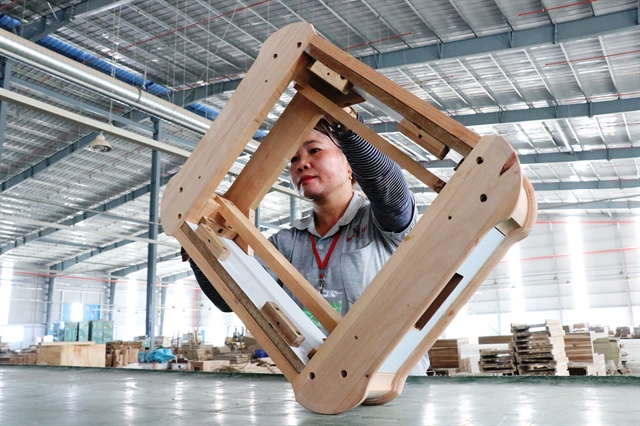Vietnam’s wood processing and export industry is on track to surpass its 2024 export target of US$15.2 billion, navigating through complicated market developments with strategic adaptability.

A worker making a wood product for export at a factory in Binh Dương Province . — VNA/VNS Photo
Vietnam’s wood processing and export industry is on track to surpass its 2024 export target of US$15.2 billion, navigating through complicated market developments with strategic adaptability.
Statistics from the General Department of Vietnam Customs showed that Vietnam's wood export turnover in the first 11 months of 2024 was estimated at over $14.6 billion. Industry experts said seeing the market’s robust recovery signs, enterprises have proactively outlined production plans and sought new markets.
According to the Vice Chairman of the Handicraft and Wood Industry Association of HCM City Nguyễn Chánh Phương, the US now accounts for 54 per cent of Vietnamese wood exports. However, it presents ongoing challenges with import taxation policies that keep businesses on their toes.
Firms in key wood-producing localities like Bình Dương, Đồng Nai, and Bình Định have been active in seeking market opportunities.
Chairman of the Bình Dương Furniture Association Nguyễn Liêm highlighted the efforts of local firms to bolster shipments, including making innovative product designs that are attracting international customers and pivoting to e-commerce channels, demonstrating flexibility in their sales strategies.
Meanwhile, enterprises in Đồng Nai province have sold their products to 50 countries and territories, with major markets being the US, the EU, Japan, the Republic of Korea and China. Since the outset of the year, the locality’s wood export value has already reached $1.3 billion, a year-on-year increase of 14.3 per cent.
Additionally, insiders have advocated for more robust domestic market development. Chairman of AA Corporation Nguyễn Quốc Khanh said the domestic interior market, comprising furniture and building materials, is estimated at some $10 billion. With a population of 100 million and a growing middle class, the domestic market presents significant untapped potential.
Vice Chairman of the Vietnam Interiors Association Vũ Hồng Cương said domestic producers are struggling to establish strong design identities and brands, adding while high-end products have been imported from Europe, mid-range and budget segments lack impressive design styles.
He suggested that besides export markets, enterprises should tap into domestic markets and set up a firm foothold here.
In the meantime, Chairman of the Vietnam Timber and Forest Product Association Đỗ Xuân Lập emphasised the need for businesses to better their competitive edge through five pillars of production technology, low-emission manufacturing, management, trade promotion and internal monitoring standards. — VNS
Read original article here